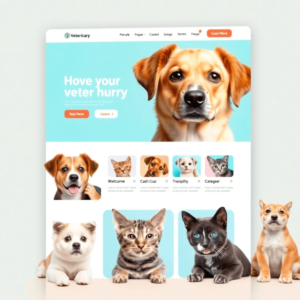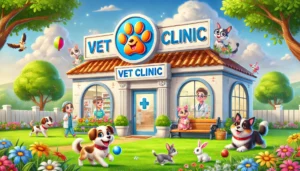Introduction
Veterinary marketing essentials are crucial for attracting and retaining clients in today’s competitive landscape. Effective marketing strategies transform veterinary practices, enabling them to thrive while building lasting relationships with pet owners.
Key aspects of veterinary marketing include:
- Establishing clear marketing goals: Retaining existing clients and attracting new ones.
- Strengthening online presence: Optimizing websites and engaging through social media.
- Fostering client engagement: Communicating effectively through personalized emails and community interactions.
This article discusses various strategies to enhance your practice’s visibility and reputation. Topics will include local SEO, online advertising (including the 3 best Reddit ads tactics to boost sales), leveraging client testimonials, social media marketing, website effectiveness, email campaigns, and real-life success stories. Embracing these strategies empowers veterinary practices to enhance their outreach and retention efforts effectively. For those looking to streamline their appointment scheduling process as part of their client engagement strategy, we recommend checking out our appointment booking service.
Understanding Veterinary Marketing
Veterinary marketing involves various strategies and practices designed to promote veterinary services to pet owners. These strategies include:
- Brand Awareness: Creating a recognizable identity for your clinic.
- Client Acquisition: Attracting new clients through different channels, such as online platforms and community involvement.
- Client Retention: Implementing methods to keep existing clients loyal and satisfied.
The Importance of Client Testimonials and Reviews
One crucial aspect of veterinary marketing is the significance of client testimonials and reviews. These elements play a vital role in establishing trust with potential pet owners, as positive feedback can greatly impact the decisions of prospective clients.
The key benefits of incorporating testimonials and reviews into your marketing efforts are:
- Credibility: Testimonials serve as social proof, highlighting your expertise and quality of care.
- Visibility: Reviews on platforms like Google or Yelp improve your clinic’s online presence, making it easier for pet owners to discover you.
- Engagement: Encouraging satisfied clients to share their experiences fosters a sense of community around your practice.
By integrating effective marketing strategies with genuine testimonials, you can create a strong foundation for attracting and retaining clients in a competitive environment.
Effective Marketing Strategies for Veterinary Clinics
1. Local SEO: Enhancing Your Online Visibility
Local SEO is a cornerstone of veterinary marketing. It ensures your clinic stands out in local search results when pet owners seek veterinary services. With a significant number of clients relying on online searches to find nearby clinics, optimizing your online presence is crucial.
Importance of Local Search Optimization
- Targeted Visibility: Local SEO helps your practice appear in search results relevant to your geographic location, attracting potential clients in your area.
- Increased Foot Traffic: A well-optimized presence leads to more walk-ins and appointments, as pet owners are more likely to choose a clinic that appears at the top of local search results.
Practical Tips for Optimizing Your Website and Google My Business Listing
- Google My Business (GMB) Optimization:
- Claim and verify your GMB listing.
- Ensure all information is accurate, including business hours, address, and phone number.
- Add high-quality images that showcase your clinic and services.
- Keyword Usage:
- Incorporate relevant keywords such as “local veterinarian” or “pet care near me” throughout your website content.
- Use long-tail keywords specific to your services for better targeting.
- Website Structure:
- Ensure clear navigation with a mobile-friendly design.
- Include location-based pages or sections detailing services offered at each location.
- Collecting Reviews:
- Encourage satisfied clients to leave positive reviews on Google and other platforms.
- Respond promptly to all reviews, showcasing an attentive and caring approach.
- Local Backlinks:
- Build relationships with local businesses and organizations to earn backlinks from their websites. This includes gaining niche relevant backlinks which can significantly improve your SEO and traffic.
- Participate in community events or sponsor local activities, earning mentions on event websites.
- Local Content Creation:
- Create blog posts or articles focused on local pet care topics or events.
- Share success stories about pets in your community to foster engagement and connection.
Implementing these strategies enhances visibility in local searches, setting the foundation for attracting new clients while retaining existing ones. Building a strong online presence through effective local SEO techniques will drive growth for your veterinary practice in today’s digital landscape.
2. Leveraging Paid Ads for Enhanced Reach
In addition to local SEO, leveraging paid ads can also significantly enhance the reach of your veterinary clinic’s marketing efforts. As the digital marketing landscape continues to evolve, understanding how to effectively use paid advertising will be crucial in attracting more clients and increasing overall visibility.
2. Harnessing the Power of Online Advertising
Online advertising offers a dynamic way for veterinary clinics to connect with potential clients. Here are some key platforms to consider:
1. Google Ads
This pay-per-click (PPC) service allows targeted visibility in search results, making it ideal for local SEO strategies. Clinics can create ads that appear when users search for specific veterinary services in their area.
2. Meta Ads
Utilizing Facebook and Instagram, practices can share engaging content directly with pet owners. Targeted advertising options enable clinics to reach demographics based on interests, behaviors, and locations.
To make your online advertising efforts more effective, consider the following strategies:
- Define Your Audience: Segment your advertising strategy by targeting specific demographics such as pet owners within a particular radius of your clinic.
- Craft Compelling Content: Use eye-catching visuals and persuasive language that resonate with pet owners’ needs and emotions.
- Set Clear Objectives: Determine measurable goals like increasing appointment bookings or website visits to evaluate campaign success.
By leveraging these online advertising platforms, you can enhance your clinic’s visibility, attract new clients, and reinforce your practice’s reputation in the community.
3. Building Trust through Client Reviews and Testimonials
Client reviews and testimonials play a crucial role in veterinary marketing. They not only enhance your clinic’s credibility but also significantly influence potential clients’ decisions. Here are effective strategies to leverage client feedback:
Encouraging Positive Reviews
- Request satisfied clients to share their experiences on platforms like Yelp or Facebook.
- Offer small incentives, such as discounts on future services, to motivate clients to leave reviews.
Handling Negative Feedback
- Respond promptly and professionally to negative testimonials.
- Acknowledge the concern, express empathy, and outline steps taken to resolve the issue.
- Use this opportunity to showcase your commitment to exceptional care and customer service.
Implementing these strategies can strengthen your practice’s reputation, driving more traffic through local SEO and digital marketing for veterinarians. Emphasizing positive experiences builds trust and encourages new clients to choose your services, making testimonial marketing an essential component of your overall strategy.
Social Media Marketing for Veterinarians
1. Engaging Pet Owners with Compelling Content
Social media management for veterinary practices plays a crucial role in connecting with pet owners and fostering a sense of community. By sharing engaging content, veterinarians can attract and retain clients while showcasing their expertise and passion for animal care.
Creating compelling content is essential for capturing the attention of your audience. Consider the following types of posts:
1. Informative Articles
Share articles that cover a range of topics, from pet health tips to seasonal care advice. This positions your practice as a trusted source of information and encourages pet owners to engage with your content.
2. Entertaining Videos
Short videos featuring cute pets or behind-the-scenes glimpses of your clinic can increase engagement. Demonstrating simple pet care techniques or showcasing staff interactions with animals humanizes your practice, making it relatable to pet owners.
3. Heartwarming Success Stories
Highlighting successful treatments or rescue stories resonates deeply with your audience’s emotions. These narratives not only demonstrate your expertise but also build trust and loyalty among existing clients.
Utilizing visuals is vital in content creation on social media for veterinarians. High-quality images and well-produced videos capture attention more effectively than text alone. Incorporate eye-catching graphics or infographics that convey important information at a glance.
Engagement goes beyond posting content; interacting with followers strengthens relationships:
- Encourage Comments: Ask questions in your posts to invite discussions. For example, “What’s the funniest thing your pet has done?” fosters engagement while building a community around shared experiences.
- Host Contests or Giveaways: Organize fun contests that encourage followers to share photos of their pets. This not only increases visibility but also generates user-generated content that showcases happy clients.
- Share User Content: Reposting client photos or testimonials creates a sense of belonging and appreciation among followers. It demonstrates that you value their input and fosters loyalty.
Incorporating these strategies into your veterinary marketing plan not only enhances your online presence but also cultivates lasting relationships with pet owners. By demonstrating genuine care for animals through engaging social media content, you position your practice as a leader in veterinary care within the community.
2. Fostering Community Engagement through Interactions
Engaging with pet owners on social media is crucial for building trust and loyalty. Here are key strategies for effective social media management for veterinary practices:
1. Prompt Responses
Quickly addressing comments, direct messages, and reviews demonstrates attentiveness. This responsiveness fosters a sense of community among followers.
2. Personalized Interactions
Tailoring your replies to individual inquiries or concerns helps pet owners feel valued. Use their names and reference their pets when appropriate.
3. Encouraging Conversations
Pose questions in your posts to invite discussions. For example, ask about pet care tips or share funny pet anecdotes to create a lively dialogue.
4. Highlighting Community Initiatives
Share posts about local events, sponsorships, or partnerships with other businesses. This not only showcases your involvement but also strengthens community ties.
Implementing these best practices for utilizing social media platforms like Facebook and Instagram enhances relationships with clients while solidifying your position as a trusted veterinarian in the community. Engaging content creation on social media for veterinarians drives meaningful interactions that resonate beyond digital platforms, contributing to long-term client retention.
The Importance of a Strong Veterinary Website
A robust website is the foundation of effective veterinary marketing. Optimizing websites for veterinary SEO is essential for ensuring visibility in search engine results. Key features that contribute to an effective veterinary website include:
- Clear Navigation: Users should easily find information about services, pricing, and contact details. Intuitive design fosters a positive user experience.
- Informative Blog Posts: Regularly updated content establishes your practice as a knowledgeable resource. Topics can range from pet care tips to insights on common health concerns.
- Online Appointment Booking System: Offering the convenience of scheduling appointments online enhances client satisfaction. This feature meets the modern pet owner’s expectations for quick and easy access.
- Mobile Responsiveness: A significant number of users browse on mobile devices. Ensuring that your website is mobile-friendly increases accessibility and improves user engagement.
- Client Testimonials Section: Highlighting positive client experiences builds trust with prospective clients. Incorporating reviews prominently can influence new visitors to choose your practice.
Investing in these elements not only attracts new clients but also reinforces existing relationships. A well-designed website acts as a powerful tool in the comprehensive strategy of Veterinary Marketing Essentials: How to Attract and Retain Clients for Your Veterinary Practice.
Email Marketing Tips for Veterinarians
Email campaigns for veterinary practices serve as a direct line of communication to pet owners. Engaging newsletters can significantly enhance client relationships while providing valuable information. Here are some ideas to consider:
1. Seasonal Pet Care Reminders
Offer tips tailored to specific seasons, such as flea prevention in summer or holiday safety during winter festivities.
2. Health and Wellness Updates
Share informative content about common health issues, vaccinations, and preventative care to keep clients informed.
3. Promotional Offers
Highlight special discounts or loyalty programs to encourage repeat visits and attract new clients.
4. Success Stories
Include heartwarming stories of successful treatments or community involvement that resonate with pet owners and emphasize your practice’s commitment to care.
5. Pet Spotlights
Feature a “Pet of the Month” section showcasing clients’ pets, which adds a personal touch and fosters community engagement.
Utilizing these strategies can help ensure your email marketing not only informs but also strengthens the bond between your veterinary clinic and pet owners. By consistently delivering relevant content, you can position your practice as a trusted resource in the eyes of your clients.
Real-Life Success Stories in Veterinary Marketing
Innovative marketing initiatives can significantly impact the success of veterinary practices. Here are notable case studies in successful veterinary marketing strategies:
1. Dr. Arathi Vinayak’s Community Outreach Programs
Dr. Vinayak implemented a series of outreach initiatives targeting local pet owners. These programs included free vaccination clinics and educational workshops on pet care, fostering trust and engagement within the community.
2. PawPrint Veterinary Clinic’s Referral Program
This clinic launched a referral program that incentivized current clients to refer new pet owners. By offering discounts or free services for each successful referral, they effectively expanded their client base while rewarding loyal customers.
3. Happy Tails Animal Hospital’s Social Media Campaigns
Utilizing platforms like Instagram and Facebook, this clinic shared heartwarming success stories of rescued pets and client testimonials. Their visually engaging content resonated with pet lovers, increasing both online engagement and foot traffic to the clinic.
These examples illustrate how creative marketing efforts can enhance visibility, foster community relationships, and ultimately drive practice growth. Each initiative showcases the importance of tailoring strategies to meet the specific needs of target audiences while building lasting connections with clients.
Trends Shaping the Future of Veterinary Marketing
The veterinary industry is changing quickly, mainly because of new technologies. It’s important for modern practices to embrace these changes if they want to attract and keep clients. Here are some key trends to look out for:
1. Telemedicine Adoption
More and more veterinarians are offering telehealth services. This means pet owners can get care without having to visit the clinic, making it more convenient for them. This not only makes clients happier but also allows practices to reach more people.
2. Personalized Experiences
Even with all the technology we have now, it’s still really important to make things personal. By understanding what each client prefers and tailoring our communication and services accordingly, we can build strong relationships that last.
3. Data-Driven Marketing
Using analytics tools helps us understand how our clients behave and what they like. With this information, we can create targeted marketing strategies that specifically address their needs.
By investing in these trends, veterinary practices can improve their services and show that they’re innovative leaders in their communities. This will help them build long-lasting loyalty among clients and stay competitive in a market that’s constantly changing.
Conclusion
In today’s competitive world, it’s crucial to have effective marketing strategies in place to keep your veterinary practice thriving.
Here are some key steps you can take:
- Reach out and retain clients: Use a comprehensive approach that includes various methods of communication and engagement with your clients.
- Improve visibility with local SEO: Optimize your online presence so that pet owners in your area can easily find you when searching for veterinary services.
- Targeted online advertising: Use online ads to reach specific audiences who may be interested in your services.
- Engage pet owners on social media: Create compelling content that resonates with pet owners and encourages them to interact with your practice.
By following these Veterinary Marketing Essentials: How to Attract and Retain Clients for Your Veterinary Practice, you’ll be able to build strong relationships with your clients and earn their trust and loyalty. Remember to regularly evaluate your strategies, make adjustments as needed, and always prioritize client engagement for long-term success. By being committed to innovative marketing techniques, you’ll not only attract new clients but also deepen the connections with your existing ones.
FAQs (Frequently Asked Questions)
What is veterinary marketing and why is it important?
Veterinary marketing encompasses various strategies and techniques aimed at attracting and retaining clients for veterinary practices. It is crucial for modern practices to thrive as it helps build trust with pet owners, enhances online visibility, and ultimately drives client engagement.
How can local SEO benefit my veterinary clinic?
Local SEO is essential for enhancing your online visibility, allowing pet owners to find your clinic easily in local searches. By optimizing your website and Google My Business listing, you can improve your clinic’s chances of appearing in search results when potential clients are looking for veterinary services nearby.
What role do client reviews and testimonials play in veterinary marketing?
Client testimonials and reviews are vital for building trust with pet owners. Positive feedback on platforms like Yelp or Facebook can attract new clients, while effectively managing negative reviews demonstrates your commitment to excellent care. This transparency fosters a strong relationship with your audience.
What are some effective social media strategies for veterinarians?
Effective social media strategies include sharing engaging content such as informative articles, entertaining videos, and heartwarming success stories that resonate with pet owners. Additionally, fostering community engagement through prompt responses to comments and messages helps establish trust and loyalty among followers.
Why is having a strong veterinary website important?
A strong veterinary website is crucial as it serves as the digital face of your practice. Key features such as clear navigation, informative blog posts, and an online appointment booking system enhance user experience, making it easier for clients to access information and services.
How can email marketing be utilized effectively in veterinary practices?
Email marketing can be effectively utilized by creating engaging newsletters that provide value to clients. Ideas include seasonal pet care reminders, updates on clinic services, or informative articles that keep clients informed and engaged with your practice.








